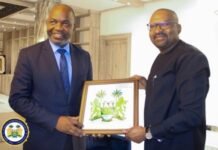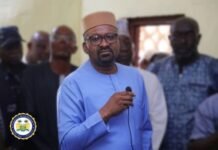By Amin Kef (Ranger)
President Dr Julius Maada Bio has addressed the United Nations Food System Stocktaking Moment on the 24th July 2023 in Rome, Italy and called on world leaders to work towards the shared goal of ensuring that every child has the opportunity to receive a healthy, nutritious meal by 2030.
The President also welcomed the announcement by the German Federal Minister of Food and Agriculture, Cem Özdemir, that his Government had decided to support the accelerated School Meals Programme through the World Food Programme and would invest, in the next five years, €22 million in Sierra Leone and Laos.
The President was speaking as a special guest of the United Nations Secretary-General, Antonio Guterres, at their Food System Stocktaking Moment in Rome, Italy, the first global follow-up to the 2021 Food Systems Summit that was held during the UN General Assembly in New York in September 2022.
In his address, President Bio highlighted the pressing issue of global food insecurity, particularly affecting children in developing countries. He emphasized that 153 million children worldwide are currently facing acute food insecurity and stressed the importance of school meals as a transformative initiative to address not only food insecurity but also education and health outcomes among children.
“His Excellences, ladies and gentlemen, 153 million children are globally faced with acute food insecurity. I believe that this session on ‘School Meals: Powering Food Systems Transformation’ will highlight school meals as a transformative initiative that will address not only food insecurity among children but also education and health outcomes.”
President Bio shared the success of Sierra Leone’s National School Feeding Programme, launched in 2018 with support from partners, which originally targeted 250 children in two districts. However, the program has since expanded to support over 800,000 children nationwide, with the Government covering 80 percent of the cost.
The positive impact of the program was evident in increased school attendance, higher retention rates, and improved enrollment, leading to a reduction in stunted growth at all levels. Additionally, gender disparity in primary schools has decreased due to the program’s implementation. President Bio assured the global community of his Government’s unwavering commitment to supporting the initiative.
“In my second term in office, my flagship initiative is to feed Sierra Leone. That is to seek to increase productivity in agriculture by boosting food security, building resilience and a sustainable supply chain of locally produced food, creating jobs, and increasing income for farmers, which are key pillars of the initiatives.”
President Bio expressed his belief that coalition partnerships, like the School Meals Coalition, are essential for Governments to receive support and improve the implementation of programs that ensure every child has access to a healthy, nutritious meal by 2030.
The German Federal Minister of Food and Agriculture, Cem Özdemir, also spoke at the summit, announcing Germany’s commitment to supporting the School Meals Programme in Sierra Leone and Laos. The German Government’s €22 million investment over the next five years will contribute to providing nutritious meals for schoolchildren in these countries, helping fight malnutrition and supporting educational outcomes.
President Julius Maada Bio’s engagement on social media, particularly on Twitter, showcased his appreciation for the UN and Secretary-General Antonio Guterres’ support in accelerating sustainable development and improving the quality of life for Sierra Leoneans. He reaffirmed Sierra Leone’s commitment to the UN Sustainable Development Goals, with a focus on education and reducing inequality.
During the summit, President Bio also met with WHO Director-General Tedros Ahdhanom Ghebreyesus to discuss emergency preparedness and public health efforts, including the establishment of a national public health agency and efforts to expand immunization, eliminate cervical cancer, and reduce maternal mortality in Sierra Leone.
On the sidelines of the Food System Stocktaking Moment, the German Minister for Food & Agriculture, Cem Özdemir, announced Germany’s €22 million grant to Sierra Leone and Laos through the World Food Programme. The grant will significantly support President Bio’s government’s push to increase the number of students covered by the School Feeding Programme to 1.5 million within the next two years. The positive impact of the program in increasing school attendance, retention, enrollment, and reducing stunting levels was highlighted during the announcement.
The summit served as a crucial platform to address global food security challenges and promote initiatives to improve the lives of children in vulnerable communities. The commitments made by world leaders, including President Bio and Minister Özdemir, are expected to pave the way for significant progress in achieving the UN’s Sustainable Development Goals related to food security, education, and reducing inequalities.




